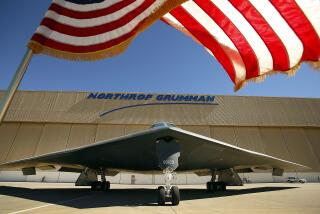Northrop Grumman drops bid for aerial refueling tanker contract
- Share via
Northrop Grumman Corp. said Monday that it was dropping out of the race for a $35-billion Pentagon contract to build 179 aerial refueling tankers, leaving its rival Boeing Co. as the sole bidder for one of the largest military contracts in U.S. history.
The move could bring an end to the Pentagon’s decade-long effort to replace its aging fleet of Eisenhower-era aircraft used to refuel U.S. fighter jets and bombers in mid-flight.
But it also represents a huge blow to California’s struggling aerospace industry. Northrop had said the contract award would have created more than 7,500 local jobs, even though the plane would have been assembled in Alabama. Follow-on contracts could involve building 300 to 400 additional tankers valued at more than $100 billion over several decades.
The Century City defense contractor said it was abandoning the bid because it believed that the odds were stacked against its contender, a tanker based on the A330 commercial passenger jet built by European aircraft maker Airbus.
Northrop Chief Executive Wesley G. Bush said in a statement that the company was “very disappointed” at the specifications, which he said “dramatically favors” Boeing’s smaller refueling tanker over Northrop’s offering.
Chicago-based Boeing said last week that it was making a bid for the contract with an aircraft based on its 767 commercial jetliners, which is smaller than what Northrop would have offered.
The Pentagon’s requirements “now clearly favors the smaller tanker,” Bush said.
Analysts said Northrop’s move could help end the Pentagon’s efforts to hand out a contract, which has been marred with delays and controversy since it was first put up for bid in 2001. The Pentagon has had to twice cancel contracts, first won by Boeing and then by Northrop.
“There’s one word to describe the history of this competition: Sordid,” said Scott Hamilton, an aviation industry consultant in Issaquah, Wash. “It’s been a complete national embarrassment.”
Boeing won the first contract in 2004, but it fell apart because of an ethics scandal that resulted in prison terms for a former senior Boeing executive and a former high-ranking Air Force official.
Despite facing political backlash, Ronald Sugar, Northrop’s then-chief executive, decided to team up with Airbus parent European Aeronautic Defense & Space Co. to go after the contract when the Pentagon relaunched the competition in 2007.
Northrop took home the contract in 2008 in a huge upset over incumbent Boeing, which had built all of the 415 tankers in the current fleet.
The decision was overturned after the Government Accountability Office found that the Air Force mishandled the yearlong competition by failing to credit Boeing for some of its proposed plane’s capabilities.
The latest requirements were released Feb. 24. But Northrop in recent weeks complained that the so-called Request for Proposal, which outlines the terms for the tanker and how contenders would be judged, was slanted in favor of Boeing and its offering.
Still, Northrop’s Bush said Monday that the company would not protest a contract awarded to Boeing.
“While we feel we have substantial grounds to support a GAO or court ruling to overturn this revised source selection process, America’s servicemen and women have been forced to wait too long for new tankers,” Bush said.
Deputy Defense Secretary William Lynn said the Pentagon was disappointed by Northrop’s decision.
“We strongly believe that the current competition is structured fairly and that both companies could compete effectively,” Lynn said.
Loren Thompson, a defense policy analyst for the Lexington Institute, said Northrop’s decision might have come down to math.
“Wes Bush evaluates every opportunity by the numbers,” Thompson said. “He didn’t see an opportunity here to reward the shareholders -- considering the way the [Request for Proposal] was written -- so he decided to walk away.”
Bush has made significant changes at Northrop since taking over as chief executive in January. On his first day on the job he announced that the company would be relocating its headquarters, which have been in Los Angeles since it was founded in 1939, to the Washington, D.C., area.
After Northrop spent about $200 million in the quest to capture its first contract, Bush didn’t think it was wise to spend an additional $100 million to go after a contract that seemed all but destined to go to Boeing, Thompson said.
The decision drew fire from some on Capitol Hill. Sen. Richard C. Shelby (R-Ala.), whose home state would have built the Northrop tankers, blamed the Air Force for Northrop’s decision to drop out of the competition.
“The Air Force had a chance to deliver the most capable tanker possible to our warfighters and blew it,” Shelby said. “This so-called competition was not structured to produce the best outcome for our men and women in uniform; it was structured to produce the best outcome for Boeing.”
Sen. Patty Murray (D-Wash.), a longtime Boeing supporter, said that despite the decision, “Boeing still must bring a very competitive bid to the table that meets all the requirements the Pentagon has set forth.”
But having only one offer could be bad for the taxpayer, said Michel Merluzeau, managing partner with aerospace consultant G2 Solutions in Kirkland, Wash. Without any competition, Boeing could charge more for its tanker, he said.
“From a price standpoint, it’s a completely different animal,” Merluzeau said. “It’s a brand-new negotiation process. The government has to talk to Boeing directly now.”
william.hennigan@
latimes.com
Times staff writer Julian Barnes contributed to this report.











